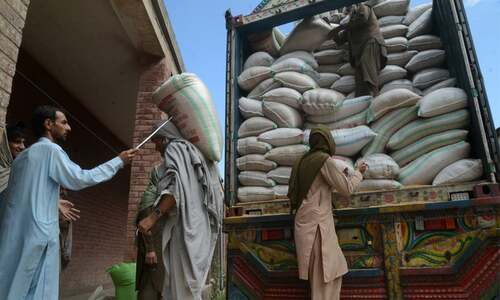IF on each annual visit to Tharparkar you find the people complaining about the same causes of their misery they have mentioned year after year, the inevitable conclusion is that the state has still not accepted its responsibility to rescue them from poverty, hunger and despair.
The Thar community’s despair is symbolised in the person of Munno Bheel. He can be seen among the landless haris who have been freed of their bondage to heartless landlords but still face an uncertain future. As he rises to speak you can see he has become thinner, his voice has lost the thunder for which it was known, and his eyes no longer sparkle.
The state has forgotten how many years have passed since his wife and children were abducted to punish him for breaking the shackles of slavery. He spent days and weeks sitting outside the Hyderabad Press Club and going on hunger strike in several spells. Then chief justice Iftikhar Chaudhry intervened but in vain, and the police officer who tried to help Munno was punished. After the tragedy of the Adiala 11 and the fruitless effort to end enforced disappearances this was perhaps the biggest setback suffered by the Chaudhry court.
Now Munno Bheel’s case is being heard by the Sindh High Court. But as days pass without any sign of his family’s recovery Munno is sinking into despair.
The Thar community’s despair is symbolised in the person of Munno Bheel.
As you move around and listen to the blistering denunciation of the exploitative system from exceptionally eloquent hari women you are overwhelmed by the callousness of landlords who keep slaves and buy and sell them with impunity and the resilience of women slaves to fight on. Across Thar you only hear of unemployment, poverty, child brides’ emaciated babies dying at home and in hospitals, shortage of water, nonfunctional ROs, denial of minimum wage to workers, indifference of political bosses, loss of land to new settlers, and the influx of extremists who are destroying the haven of communal harmony the civilised people of the desert have maintained.
Meanwhile, concerns about the long-term viability of the Thar coal project and its impact on the life of the community keep growing. The National Commission for Human Rights had taken considerable interest in Tharparkar’s development and human rights issues before it became dysfunctional last year. The commission had decided to use civil society resources to acquire a proper understanding of the socioeconomic and environmental impact of the ongoing projects on the local community, by documenting the affected community’s experience and its opinions on the Thar coal project. The report of the committee of researchers set up for the purpose has been released: Its key recommendations are:
Work in Block II that has already been developed needs to be phased out and work in other blocks suspended in view of the discontent in the local community, prohibitive cost of the project, environmental damage and adverse effect on livelihoods, and the need for plans for energy generation from renewable resources.
The local community must be taken on board for each development plan.
The Thar people want an end to their dependence on rain. They demand a new system of channelling river water through canals and pipelines for both drinking and irrigation purposes.
A new and permanent mechanism should be created for maintaining fodder banks and protection of grazing grounds for the livestock.
The local population’s fears of unfavourable demographic change because of an influx from other parts of the country must be allayed.
Aquifers need to be protected. Coal extraction requires dewatering of aquifers and this may destroy the rain-fed layer.
The government has allocated Rs72 billion for Thar coal infrastructure which also affects the local community. About two per cent must be reserved for local communities’ development.
Land settlement in Thar is long overdue.
Coal development is resulting in many social changes ie soaring land prices, rise of capitalists, consumerism, widening of rich-poor divide, and marginalisation of asset-less, illiterate and poorly skilled communities. A comprehensive plan should be launched to improve access to education, community infrastructure, mobility, nutrition levels, and health facilities.
All of these are sound recommendations and if the Sindh government does not take them seriously it will be guilty of betraying one of the country’s most precious human stock. It is now clearer than ever that Thar’s misery cannot end until the folly of using coal and obsolete machinery for producing electricity is abandoned.
The Thar development agenda should give priority to exploitation of Nagarparkar’s potential to attract tourists. The historical and religious monuments in Nagarparkar are valuable parts of Pakistan’s heritage. These monuments have survived many decades of neglect but any further negligence could cause irreparable damage and disappearance of attractions for tourists.
The virus threat: As the threat from coronavirus becomes more and more serious all issues and debates are becoming irrelevant. While one hopes the efforts to contain the pandemic are as effective as government spokespersons claim they are, evidence on the ground dispels complacency. Screening arrangements at airports have been described as perfunctory by travellers from the US and Canada. Arrangements for treatment of infected persons are limited to main cities and the lack of such facilities in the rural areas, where huge numbers of people cannot stay away from their livestock, is giving rise to concern. It is good that the prime minister has decided to supervise the fight against the disease but everything will depend on the quality of services he supervises. The people want to be reassured that our health system has the capacity to learn to face the challenge of the latest pandemic. Priority needs to be given for ensuring free treatment of coronavirus cases throughout the country, especially in areas like Thar, so that the poor do not die for want of money.
Published in Dawn, March 19th, 2020














































